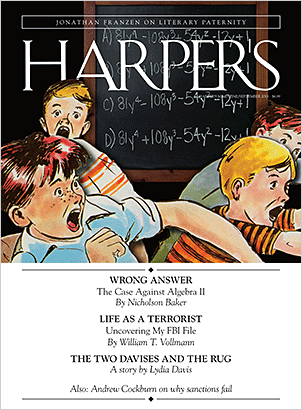Introducing the September 2013 Issue
The case against Algebra II, the FBI’s file on William T. Vollmann, and our new Washington correspondent
Reading, writing, and arithmetic have always been required subjects in schools — but, Nicholson Baker argues in “Wrong Answer: The Case Against Algebra II,” one particularly tortuous discipline should not be compulsory for high school students. Although Baker concedes the beauty and utility of higher math, he also points out that its rigors are painful and dispiriting for many of the students it is forced upon. Algebra II is dubious preparation for a future career and financial success — though quite a few colleges require it for admission — and makes so many students miserable, Baker notes, that it may even promote higher dropout rates. What he objects to most, however, is the way math has been enlisted in a pedagogic crusade whose victories are measured by test scores.
In his Anti-Economist column this month, Jeff Madrick takes aim at Harvard’s economics department. In his view, the faculty members — among them such luminaries as Larry Summers, Alberto Alesina, Jason Richwine, and Kenneth Rogoff — have either dreamed up or endorsed nearly every bad economic idea that has been put into play for the past twenty years.
And in a report that should give all of us pause, William T. Vollmann describes the genesis and contents of his FBI file — at least the 294 heavily redacted pages that he obtained through the Freedom of Information Act. Citing the “anti-progress themes” of Vollmann’s novels and his suspicious propensity for visiting esoteric foreign countries, the agency concluded that he was anti-American and even explored the possibility that he was the Unabomber. In an age of ever more intrusive surveillance, Vollmann’s experience may become the rule rather than the exception.
This month’s issue introduces Andrew Cockburn as our Washington correspondent. A highly respected journalist, Cockburn will be reporting for Harper’s Magazine four times a year from inside D.C., on topics like this month’s offering, which focuses on the U.S. Office of Foreign Assets Control, an obscure government agency that operates with little congressional oversight yet imposes, often with gratuitous cruelty, punishing economic sanctions on countries and individuals around the globe. What particularly bothers Cockburn about the agency is the fact that its application of these sanctions often produces the opposite effect from the one intended. The sanctions against Iran, for example, which were intended to topple the existing government, have instead mobilized the country’s middle class against the United States.
Also in this issue, Leslie Jamison explores the riddle of Morgellons, an illness that thousands of people suffer from but that has yet to be recognized by the medical establishment; Jonathan Franzen seeks out literary fathers; fiction by Ben Marcus and Amos Oz; and a moving exchange of emails between an Iraqi formerly employed by American military forces, and functionaries at the U.S. State Department.



